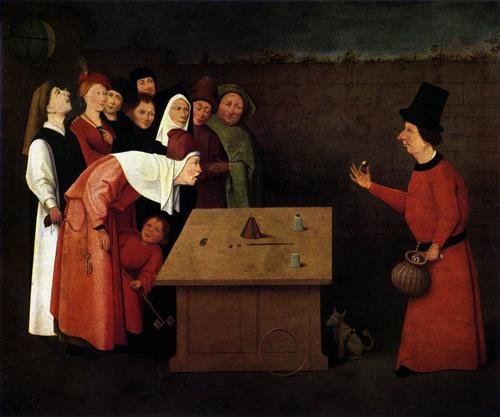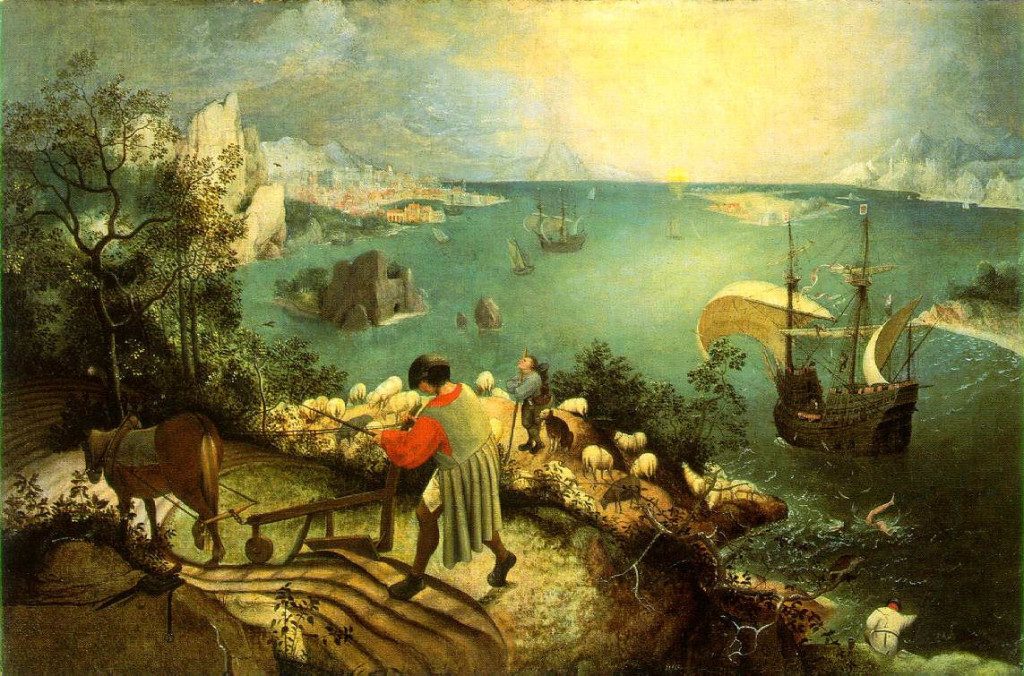The comfort of words. Think the covert substitutions and mental projections to which they are subject.Climbing out of our universe, one rung at a time…
“A name is a prison, God is free,” or so said the Greek poet Nikos Kazantzakis. What he meant was that though language is valuable to the individual, it is, by very necessity, limiting, and creates for humanity an invisible prison. Language implies boundaries. A spoken word creates something: a dog, a tree, a man. It fixes their nature before our eyes; henceforth their shapes are, in a sense, our own creation. They are no longer part of the unnamed shifting architecture of the universe. They have been transfixed as if by sorcery, frozen into a concept, a word. Powerful though the spell of human language has proved itself to be, it has laid boundaries upon the cosmos and the concept of the infinite and eternity.

—Handmade oil painting reproduction of The Magician, one of the most famous Renaissance-Early Oil Paintings painted by Early Netherlandish painter Hieronymus Bosch.
Hieronymus Bosch (born Jeroen Anthoniszoon van Aken, c. 1450 – August 9, 1516) was an Early Netherlandish painter. His work is known for its use of fantastic imagery to illustrate moral and religious concepts and narratives. Hieronymus Bosch lived during the ‘Dark Ages,’ when the world was undergoing a transition from the Gothic to the Renaissance period.—click image for source…
No matter how far-ranging some of the mental probes we have philosophically devised, by our own created nature we are forced to hold to hold the specious and emerging present and transform it into words. Words may be startling in their immediate effectiveness, but at the same time, they are always finally imprisoning because principally man has constituted himself himself as prison keeper. This is not necessarily done out of conscious intention, but because for immediate purposes, the result is an unnatural creation of a world, called a cultural world, to which one feels at home….

—Painting is by Pieter Bruegel the Elder. (created around 1560)
The notable thing in this painting is the fact that the anecdote of Icarus’ pride disappears in the margins of the painting.
The attention is focused on the farmer with his plow, on the shepherd and his herd, on the harbor and the ships – on the economy, in fact. The real transformations are taking place in the society and a mythical hero such as Icarus has become marginal.—click image for source…
It defines his needs and allows him to lay a small immobilizing spell upon the nearer portions of his universe. Nevertheless, it transforms that universe into a cosmic prison house that is no sooner mapped out than man feels its inadequacy and his own, limited to no more than mere speculation. We suspiciously sense, in the concept of an expanding universe, for example, derived from the primordial atom, some kind of oscillating human heart. At the instant of its contraction we will vanish. Above us may lie realism, but it is beyond our power to grasp. ( to be continued)…





 COMMENTS
COMMENTS